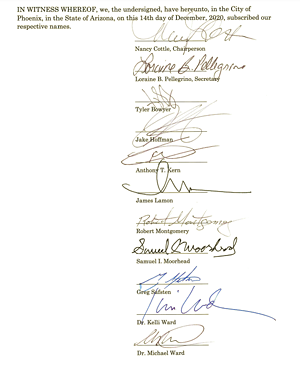Ward and her husband, Michael, filed a lawsuit in federal court on Tuesday seeking to block the committee's demand to produce the records.
The couple's attorney argues that Congress's request was too broad and that, given their day jobs as doctors, they might inadvertently violate patient confidentially rules if the phone records are shared because they conducted telehealth sessions.
Work phone data for public officials are already public records. Ordinarily, anyone can access them without a court order. The phone call logs, text messages, and emails that elected and appointed public officers send or receive are public records because they are transmitted on devices paid for by taxpayers.
Ward's phone data is not public record, because her political involvement is confined to her role with the Arizona Republican Party. It is not a public agency and she is not a public official.
The United States House Select Committee on the January 6 attack of the U.S. Capitol was formed in July to investigate the riots. More broadly, the committee decided to investigate any efforts or plots to overturn the results of the November 2020 presidential election.
That's what led committee investigators to Ward but it is not immediately clear what exactly the panel is seeking on her phone.
The committee recently turned its attention to former president Donald Trump's so-called "alternate electors," groups of uncertified electors in swing states, who claimed to be submitting votes for Trump, despite a Joe Biden victory.
The Wards were both part of Arizona's slate of fake electors, alongside other prominent Arizona Republicans, including state representative Jake Hoffman, former state legislator Anthony Kern, and Turning Point USA executive Tyler Bowyer. The group delivered a document to Congress in December 2020 which claimed to cast Arizona's vote for Trump instead of Biden.
Last week, the January 6 committee subpoenaed T-Mobile, the Wards' wireless provider, seeking detailed phone records spanning from November 1, 2020, through January 31, 2021.
And T-Mobile was ready to comply until the Wards filed a lawsuit.
Ward, like other Trump allies who are fighting subpoenas for phone records, argues in the lawsuit that the subpoena violates her First Amendment rights.
By providing detailed call logs of her activities as chairwoman, Ward argues, the information would provide Congress "with the means to chill the First Amendment associational rights not just of the plaintiffs but of the entire Republican Party in Arizona."
She also claims that, given that she and her husband are practicing doctors, the release of their phone records would violate The Health Insurance Portability and Accountability Act. The law, also known as HIPAA, protects the privacy of patients by barring doctors from sharing medical information with unauthorized third parties.
Still, health information records could hypothetically be redacted before they were made public. Providers may release records if subpoenaed, according to the U.S. Department of Health and Human Services.
Also, it is common for a judge to review sensitive records under seal before deciding which, if any, may be released to the public.
Outside of politics, Kelli Ward is a weight-loss doctor in Lake Havasu City; her husband is an emergency physician.
In an affidavit attached to the complaint, Ward testified that she had seen more than 150 patients during the relevant time span.
The Wards' attorney, Alexander Kolodin with the Phoenix-based Davillier Law Group, did not return multiple inquiries from Phoenix New Times on Thursday. Ward did not reply to an email from New Times.
“Had we not been at home, T-Mobile would have released the records without any chance of intervention from us,” Ward told conservative Breitbart News. “I refuse to lie down and have my constitutional rights trampled by a rogue committee.”
An unidentified source told Politico that the Arizona Republican Party is likely to cover the Wards' legal fees in the ongoing dispute.
Ward's attorneys argue in the complaint that there is not a clear link yet established between Ward and the events of January 6.
But in the weeks after the 2020 presidential election, the Arizona Republican Party sent out tweets suggesting that their followers give their lives for the fight against election fraud, with one since-deleted tweet reading "die for something."
Leftist Activists in the House are targeting Chairwoman Kelli Ward because she is EFFECTIVE
— Kari Lake for AZ Governor (@KariLake) February 3, 2022
Kelli isn’t like the Republicans of yester-year who roll over without a fight. Like President Trump, she will stand her ground. https://t.co/aY90nEVYkm
Ward's tenure as the powerful chairwoman of Arizona's Republican party has been polarizing even within her own party. After she was elected, some GOP lawmakers called for an audit of the party's own vote.
Some more moderate Arizona Republicans said that her victory in her bid for internal reelection as state chairperson, just days after Biden's inauguration, was a sign of Trump's continuing influence in the party.
Ward has has since fought to preserve the Arizona GOP's focus on voter fraud accusations, calling for Maricopa County election officials to be jailed and spearheading a pressure campaign against the county on behalf of Trump, as one Arizona Republic investigation found.
Committee investigators are hoping the extent of that influence may be revealed by her phone records.










